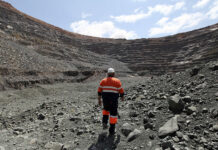
De Beers has chopped its rough diamond production forecast for 2024 by about 10% dropping it to between 26m and 29m carats from the previous estimate of 29m to 32m carats.
According to Anglo American CEO Duncan Wanblad – reporting the group’s production figures for the March quarter – the reason is “on-going uncertainty around economic growth prospects has led to a continued cautious purchasing approach by sightholders and the recovery in rough diamond demand is expected to be gradual through the rest of the year.”
The cut comes after persistent optimism from De Beers over the past year about the medium to long-term recovery prospects for the rough diamond market although Wanblad cautioned in February that there were significant stressors in the diamond business.
He commented, “there is a level of uncertainty we can’t deny, and we are taking material actions to make it more robust.”
According to the March quarterly figures diamond production dropped 23% during the quarter to 6.9m carats with output from the major Botswana mines falling 28% to 5m carats.
Copper was the only bright spot in Anglo’s March quarter results which reported a flat performance in iron ore and a decline in platinum output.
Copper production was 11% up at 198,100t reflecting a 21% jump in output from Quellaveco because of planned higher grades as well as higher throughput at Collahausi and El Soldado partially offset by planned lower grade at Los Bronces. Production guidance for 2024 is unchanged at 730,000t to 790,000t.
Total platinum group metal (pgm) production fell 7% reflecting in particular a 16% drop in output at the troubled Amandelbult mine which produced only 127,100oz “driven by lower recoveries and plant equipment breakdowns.”
Production guidance for 2024 for metal-in-concentrate and refined production is unchanged at 3.3m oz to 3.7m oz “subject to the impact of Eskom load-curtailment.”
The group’s iron ore production was flat with a strong performance at the Brazilian Minas-Rio operation being offset by a planned decrease at Kumba “to align with third party logistics constraints.”
According to Kumba CEO Mpumi Zikalala “export sales volumes were significantly impacted by challenging operating conditions at the Saldanha Bay port with equipment maintenance now being undertaken by Transnet to primarily address the stacker-reclaimer reliability issues. Our production and sales guidance for the full year is unchanged at 35mt to 37mt and 36mt to 38mt respectively.”
Zikalala added, “the iron ore market pulled back strongly in the first quarter and the reconfiguration of our business to a lower production and cost profile should ensure that we are more resilient in the face of a volatile market environment. The execution of the business configuration plan is on track.”










